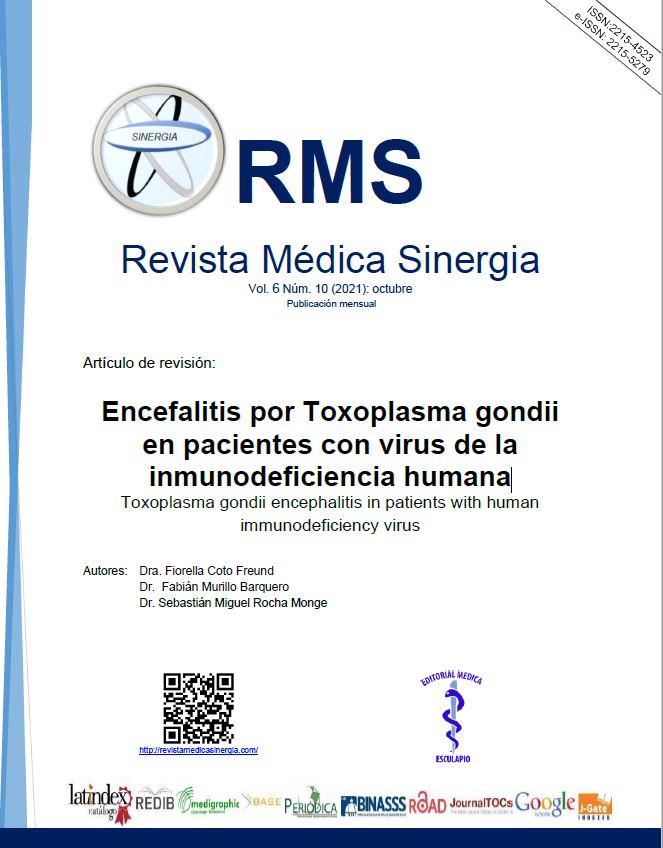Resumen
Los pacientes seropositivos con conteos de CD4 menores a 100 células/microL que no cuentan con un tratamiento antirretroviral adecuado tienen hasta un 30% de probabilidad de contagio por Toxoplasma gondii, un parásito oportunista que puede producir complicaciones oftálmicas, neurológicas y en raras ocasiones sistémicas. Se debe sospechar afectación a nivel de sistema nervioso central en el contexto de pacientes positivos por virus de inmunodeficiencia humana, inmunocomprometidos, con síntomas neurológicos que sugieran compromiso a nivel central; para los cuales, los estudios por imagen serán los de primera elección para obtener un diagnóstico rápido y oportuno, que permita iniciar lo antes posible un régimen terapéutico adecuado.
Palabras clave
Citas
Marra CM. Central nervous system infection with Toxoplasma gondii. Handb Clin Neurol. 2018;152:117–22.
Elsheikha HM, Marra CM, Zhu X-Q. Epidemiology, pathophysiology, diagnosis, and management of cerebral toxoplasmosis. Clin Microbiol Rev [Internet]. 2021;34(1). Disponible en: http://dx.doi.org/10.1128/CMR.00115-19
UpToDate [Internet]. Uptodate.com. [citado el 7 de julio de 2021]. Disponible en: https://www.uptodate.com/contents/toxoplasmosis-in-patients-with-hiv/print?search=toxoplasma
Wang Z-D, Wang S-C, Liu H-H, Ma H-Y, Li Z-Y, Wei F, et al. Prevalence and burden of Toxoplasma gondii infection in HIV-infected people: a systematic review and meta-analysis. Lancet HIV. 2017;4(4):e177–88.
UpToDate [Internet]. Uptodate.com. [citado el 7 de julio de 2021]. Disponible en: https://www.uptodate.com/contents/toxoplasmosis-acute-systemic-disease/print?search=toxoplasma&source=search_result&selectedTitle=1~150&u%E2%80%A6
Vidal JE. HIV-related cerebral toxoplasmosis revisited: Current concepts and controversies of an old disease. J Int Assoc Provid AIDS Care. 2019;18:2325958219867315.
Schlüter D, Barragan A. Advances and challenges in understanding cerebral toxoplasmosis. Front Immunol. 2019;10:242.
Panel on Opportunistic Infections in HIV-Infected Adults and Adolescents. Guidelines for the prevention and treatment of opportunistic infections in HIV-infected adults and adolescents: Recommendations from the Centers for Disease Control and Prevention, the National Institutes of Health, and the HIV Medicine Association of the Infectious Diseases Society of America. http://aidsinfo.nih.gov/contentfiles/lvguideline s/adult_oi.pdf (Accessed on June 20, 2021).
Elicer I. Approach to an intracranial mass in patients with HIV. Curr Neurol Neurosci Rep. 2020;20(9):43.
Roche AD, Rowley D, Brett FM, Looby S. Concentric and eccentric target MRI signs in a case of HIV-associated cerebral toxoplasmosis. Case Rep Neurol Med. 2018;2018:1–3.
Greenway MRF, Sacco KA, Burton MC. In deep: Cerebral toxoplasmosis. Am J Med. 2017;130(7):802–4.
Bowen LN, Smith B, Reich D, Quezado M, Nath A. HIV-associated opportunistic CNS infections: pathophysiology, diagnosis and treatment. Nat Rev Neurol. 2016;12(11):662–74.
UpToDate [Internet]. Uptodate.com. [citado el 7 de julio de 2021]. Disponible en: https://www.uptodate.com/contents/overview-of-prevention-of-opportunistic-infections-in-patients-with-hiv
UpToDate [Internet]. Uptodate.com. [citado el 7 de julio de 2021]. Disponible en: https://www.uptodate.com/contents/approach-to-the-patient-with-hiv-and-central-nervous-system-lesions
Hernandez AV, Thota P, Pellegrino D, Pasupuleti V, Benites-Zapata VA, Deshpande A, et al. A systematic review and meta-analysis of the relative efficacy and safety of treatment regimens for HIV-associated cerebral toxoplasmosis: is trimethoprim-sulfamethoxazole a real option? HIV Med. 2017;18(2):115–24.

Esta obra está bajo una licencia internacional Creative Commons Atribución-NoComercial 4.0.
Derechos de autor 2021 Array


